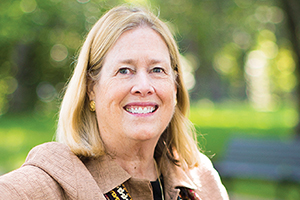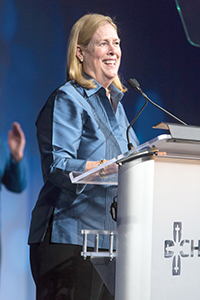By PATRICIA CORRIGAN
A champion of social justice who puts her faith in action through work. A collaborative and caring colleague. A leader in meaningful health care reform, environmentalism, socially responsible investing, protecting immigrants, palliative care and reducing community violence.

Photo by Chris Ryan/© CHA
Those are just some of the ways her colleagues describe Colleen Scanlon, senior vice president and chief advocacy officer of Catholic Health Initiatives. Scanlon has done yeoman's work for CHA as well. She chaired CHA during the roller-coaster run-up to the passage of the landmark Affordable Care Act, an achievement that President Barack Obama said couldn't have happened without the backing of the Catholic health ministry.
As chair of CHA's Membership Study Committee, she led an exacting, scholarly and inclusive discourse that ultimately led CHA's members to open their ranks to for-profit Catholic health systems. She's been a force in CHA's work to raise awareness of human trafficking and to promote the spread of environmentalism in health care. For her contributions and leadership in the Catholic health ministry, Scanlon is the recipient of the 2018 Sister Concilia Moran Award.
First awarded in 1992, and named for Sr. Mary Concilia Moran, RSM, the annual award recognizes an individual in Catholic health care for creativity and breakthrough thinking that advances the ministry. Scanlon accepted the award June 11 at the Catholic Health Assembly in San Diego.
"It's difficult for me to even visualize a Catholic Health Initiatives without Colleen Scanlon as the leader of our advocacy efforts," said Kevin E. Lofton, chief executive of CHI, one of the largest nonprofit health systems in the nation, with operations in 17 states. Scanlon was one of the first key executives hired by the system.
"Colleen has been with CHI since 1997, coming aboard as the strong voice for advocacy efforts and helping develop a broad range of programs from shareholder activism to violence prevention. She's devoted more than two decades of her professional career to CHI advocacy efforts that focused on one overriding purpose: creating healthier communities and ensuring that the voiceless have a voice. I can think of few individuals more worthy of this award than Colleen," Lofton said.

Photo by Jerry Naunheim Jr./© CHA
Scanlon — a registered nurse, a lawyer and an advocate for the poor — never forgot the lessons she absorbed caring for vulnerable patients, especially as a nurse specialist in palliative care. "Seeing myself as a clinician has clearly informed my professional path," she said. "I started as an advocate at the bedsides of patients and their families, and have taken that to a different platform, and that makes me a better advocate."
Born in Westchester County, N.Y., Scanlon grew up there in a "warm and loving family" that included a lot of stockbrokers. Originally, Scanlon thought that was the career she would pursue. She enrolled in the business school at Georgetown University in Washington, D.C.
"I lived with nurses and I liked what they were thinking about, talking about and getting passionate about more than what I was focused on, so I transferred to the school of nursing," Scanlon said. She has a Bachelor of Science in nursing and a master's in gerontology. She received her law degree in 1992 from Pace University School of Law in New York, where she was awarded a health law and policy certificate.
Scanlon has been able to work to affect change in so many different areas that aligned with her core beliefs in social justice because in many respects she was given a blank slate at CHI. "I was so fortunate when I came to CHI to be the first to have the opportunity to lead the advocacy program," she said. "The board and the representatives of the founding congregations had a broad view of advocacy. They saw CHI as health care provider, employer, community member, purchaser, investor and corporate citizen and encouraged exploring different ways to influence change for the betterment of our communities. That has led to the breadth of the program that has evolved."
Violence prevention soon emerged as a top priority at CHI. Ten years ago, Scanlon spearheaded CHI's United Against Violence program, which demonstrated the health ministry's mission of creating healthier communities by seeking to reduce violence in all forms in every community that CHI serves. "We continue to look for ways to mitigate violence in this country," Scanlon said of the program, which operates in 45 different sites across the country, serving each community in CHI's national enterprise.
As an executive sponsor of the violence prevention program, Scanlon developed the national initiative and became the driving force and champion of the first comprehensive anti-violence program of its type ever created by a national health system. The program, which includes a 28-page resource guide developed in 2012, recognizes that violence is a complex public health issue requiring solutions that employ multiple methods and mediums.
The approach involves:
- public policy
- socially responsible investing
- community-based programs
- education and training
- strong partnerships with local and national organizations to influence social and political norms
Mike Romano, CHI's director of media relations, said this multifaceted approach to violence prevention has become "a hallmark in the health care industry and attracted attention from peer organizations and external audiences, including the American Hospital Association."
One component of the program is to help raise awareness about human trafficking, an initiative that Scanlon has shared across CHI and beyond. She oversaw CHI's participation in the development of "Addressing Human Trafficking in the Health Care Setting," an education module developed in conjunction with the Massachusetts General Hospital Human Trafficking Initiative.
"Human trafficking is one of the greatest tragedies, a devastating issue, and it's really important that health care providers be aware of how to identify someone experiencing that degradation and respond," Scanlon said. Also, through shareholder activism, Scanlon works to raise awareness of human trafficking in the hospitality and travel industries.
For more than two decades, Scanlon has helped direct CHI's Mission and Ministry Fund, a grant program that has provided approximately $80 million for almost 500 different projects in the U.S. and around the world including violence prevention.
As a public policy advocate, Scanlon continues to work to ensure that all people in the United States have access to — and insurance coverage for — needed health care services. Scanlon is proud of the ministry's unstinting and strong advocacy for the poor and vulnerable. Although she is disappointed in the current direction of U.S. health care policy, she sees the glass half full: nearly 20 million have gained coverage through the ACA.
In a recent interview, she said, "The Catholic ministry worked hard in the development and passage of the Affordable Care Act, recognizing that though it was not perfect, it was the first meaningful legislation for people who had been left by the wayside in the health care system. Since then, we have worked hard to make sure people get enrolled in the insurance marketplace and get access to services they need. We are facing many challenges to get coverage for all — this is a difficult time."
There are other opportunities for the ministry to make an impact as well. "Our ability to advance good stewardship of the earth and its resources is really important as we know more and more about how health and well-being is connected to the environment," Scanlon said. "We also need to look at policies that have to do with economic development, affordable housing and
palliative/end-of-life care. We must continue to think about advocacy in the broadest sense."
A colleague of Scanlon's, Sr. Peggy Martin, OP, the 2015 recipient of the Sister Concilia Moran Award, said that like Sr. Moran, Scanlon has the fortitude to fight the good fight to make the world a better place. "Sr. Moran was a real go-getter who fought for justice and for what was right — and that's what Colleen does every day," Sr. Martin said.
